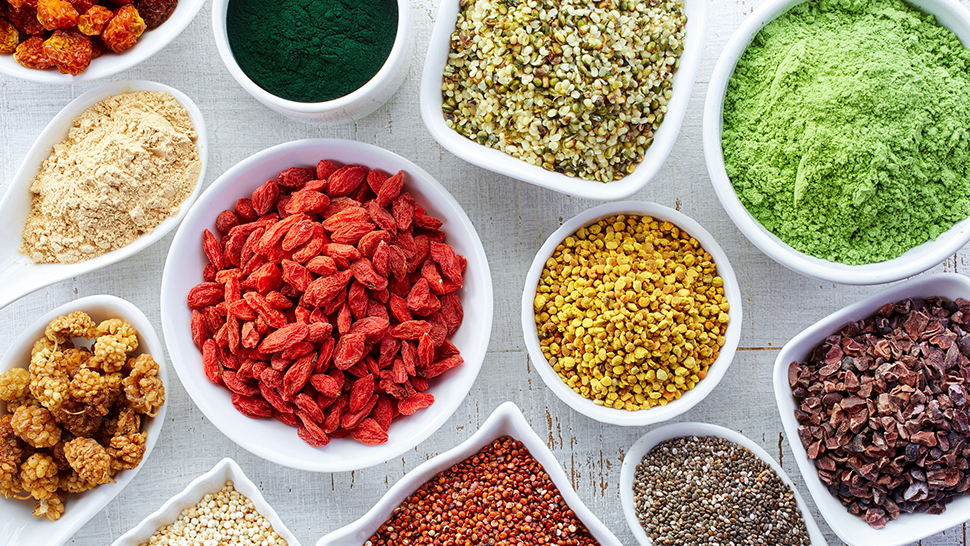
What are superfoods? How much should I eat to get antioxidant health benefits?
Keeping up with trendy superfoods is likely to give you whiplash: one month acai is the most popular plant on the block, only to be replaced by goji berries. Chia seeds and spirulina are now considered superfood staples, while maqui berries, bee pollen, and wheat germ are on smoothie-bar menus across the country. However, you are not alone in wondering if the teaspoon of maca powder in your smoothie actually offers any benefit.
Let’s first discuss what a superfood is — and is not. The word superfood is often used to describe foods that are high in nutrients with antioxidant qualities, such as vitamins and minerals, but also in other phytonutrients found in plants, such as flavonoids, flavones, catechins, polyphenols, and phytoestrogens. These molecules are collectively referred to as “antioxidants” because of their ability to prevent or slow damage caused by free radicals, which are free-floating unstable molecules found in cells. Although all fruits, vegetables, herbs, and spices contain some antioxidants, some foods such as spinach, berries, and tropical fruits like acai have unusually high amounts. Because of this, the media has crowned these antioxidant-rich foods as superfoods. However, the term is controversial with nutrition experts, because there is no agreed-upon definition nor regulations governing its use, so it really has very little meaning.
A little history: To determine which foods have the highest amounts of antioxidants, the National Institutes of Health developed the Oxygen Radical Absorbance Capacity (ORAC) score, which measures the total antioxidant capacity of a particular fruit, vegetable, or spice to remove free radicals. Scores were assigned to foods based on their ability to clear these unstable compounds. Kidney beans, pecans, and elderberries scored among the highest on the ORAC scale, with scores over 15,000 units per 100 grams. At one time, researchers suggested that the human body could use about 3,000 to 5,000 ORAC units per day. That adds up to about five servings of fruits and vegetables for most produce — which happens to be the recommended daily intake suggested by the Dietary Guidelines for Americans.
However, the USDA discontinued the ORAC database in 2012 after mounting evidence that ORAC values have no real relevance to a food’s actual ability to clear antioxidants in the body. Researchers found that laboratory testing of a food’s antioxidant capacity does not translate to how antioxidants function within the human body. Scientists now understand that antioxidants have a wider range of functions than just absorbing free radicals, which means assigning scores based on one function is irrelevant. In short, just because a food has a high antioxidant amount, it is not necessarily than another with a lower count. When considering the healthfulness of a food, there are many factors to consider beyond antioxidant amount, such as fiber, protein, the type of fat, and what other vitamins and minerals it contains.
OK, how do we determine how many “superfoods” to eat? There’s no magic amount and getting the benefits depends on the food. Also, no one food group (or food color) contains all of the necessary nutrients needed for human life, so variety is key. Consuming an array of colorful fruits, vegetables, whole grains, nuts, seeds, and lean or plant-based proteins every day means you’ll increase the amounts and types of antioxidants within your body, which is better than superdosing on one particular food or antioxidant.
So eat a rainbow of colorful plants daily, and if you like adding a teaspoon of maca powder to your morning smoothie, there’s no harm in doing so. Just know that the tablespoon of moringa pesto on your pasta isn’t going to save your life.
At Bon Appétit, we know there’s a lot on your plate that you worry about. That’s why we have a team of registered dietitian nutritionists ready to answer your nutrition questions about which food choices will help you avoid unwanted pounds, work or study (and sleep!) better, and form long-lasting healthy eating habits. Email your questions and feedback to nutrition@cafebonappetit.com.